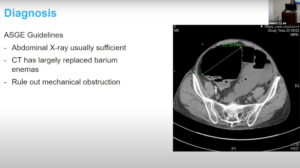NEW YORK (Reuters Health) – A preoperative MRI showing whether or not a rectal tumor encroaches on the circumferential resection margin (CRM) is a better predictor of recurrence risk and survival than TNM-based criteria, according to a UK study.
In fact, the researchers conclude, “High-resolution MRI CRM assessment identifies patients with particularly poor outcomes, which enables teams to specifically direct treatment toward reducing LR (local recurrence) and improving survival.”
They explain that while up to 80% of rectal tumors undergoing resection are stage II or III, their extent ranges from a slight breach of the rectal wall to invasion well beyond the mesorectal fascia. MRI can accurately define the extent of the tumor, but the prognostic importance of tumor involvement at the resection margin has been unknown.
To investigate this issue, Dr. Gina Brown, with The Royal Marsden Hospital in Sutton, Surrey and colleagues conducted a follow-up study of 374 patients with rectal cancer who underwent preoperative high-resolution MRI. If the tumor was 1 mm or less from the CRM on the MRI, it was classified as CRM-involved; otherwise, it was designated CRM-free.
MRI indicated an involved CRM in 64 of the patients, and this was confirmed on pathology in 53, according to the report in the Journal of Clinical Oncology online November 25.
In the group with CRM involvement on MRI, 5-year overall survival was 42.2%, compared to 62.2% in the other patient with a CRM-free classification. On multivariate analysis, this translated to a mortality hazard ratio of 1.97 (p<0.05), the team found.
Similarly, the 5-year disease-free survival rate in the two groups was 47.3% versus 67.2%, respectively (HR, 1.65; p<0.05).
Corresponding rates of local recurrence were 20% versus 7.1% (HR, 3.50; p<0.01), the report indicates.
Dr. Brown and colleagues point out that conventional TNM staging does not “adequately” predict risk of local recurrence (LR). “Therefore,” they write, “a strategy of using pelvic radiotherapy to reduce LR based on preoperative assessment of AJCC TNM stage may not be optimal.”
Given that recurrence was highest and survival poorest in patients with CRM involvement, they conclude, “Future clinical trials should reappraise the intensity of adjuvant therapy and surveillance for this high-risk group.”
J Clin Oncol 31;2013.




